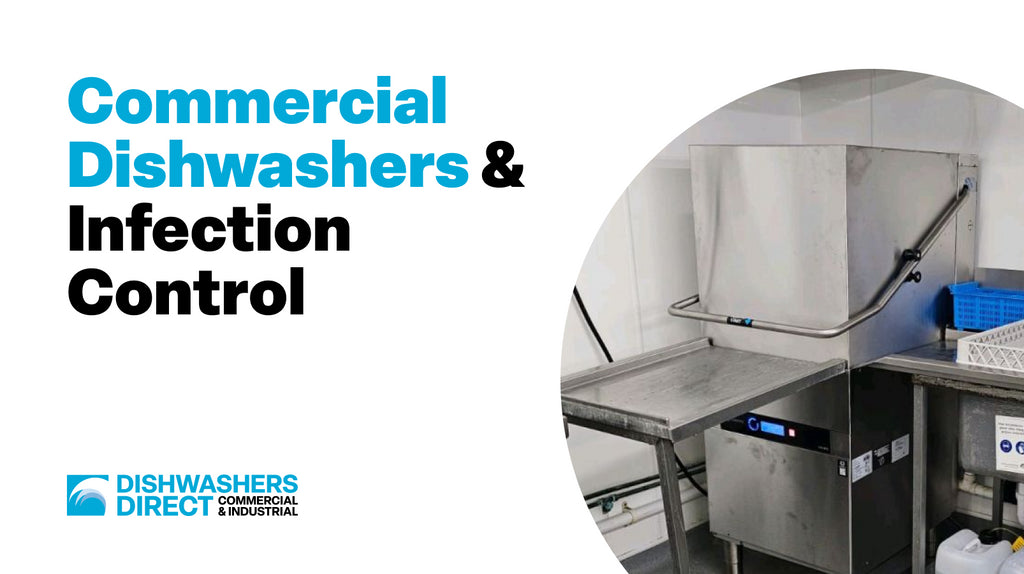Commercial Dishwashers & Infection Control
Posted by SAMUEL DEAKIN

No matter what industry you work in, cleanliness is important. However, if you work with vulnerable people in settings such as care homes or hospitals, the importance of cleanliness and hygiene will ascend to a new level.
In this blog we’re going to look at the importance of infection control and the role commercial dishwasher play in keeping everyone safe and compliant with UK laws.
What is Infection Control?
Infection control means stopping germs from spreading to prevent sickness and disease. In places like hospitals, care homes, or dentists, this is of paramount importance as germs can spread much more easily when people are already ill.
The Legal Bit
In the UK, the main law surrounding infection control is called the Health and Social Care Act 2008. The rulebook that accompanies it is called the Code of Practice. This tells care providers what they must do to keep people safe from infections.
Key Points:
1. Keep The Environment Clean – Hospitals, care homes, clinics, and similar environments must be clean and tidy.
2. Train Staff – Workers must be taught how to stop infections like washing hands properly and wearing gloves.
3. Use Equipment Safely – All tools and medical equipment must be cleaned or thrown away after use.
4. Check For Infections – Care homes and hospitals must look out for signs of infections and deal with them quickly.
5. Give Information – If someone moves between hospitals or care homes, staff must share infection information to keep everyone safe.
6. Use Antibiotics Carefully – Staff must avoid using too many antibiotics, so bacteria don’t become resistant to them, making them harder to treat.
The Care Quality Commission (CQC) checks whether hospitals, care homes, and similar industries are following these rules. If they aren’t, they are told to improve or closed down.
The Role of Commercial Dishwashers
Infection control in the kitchen means having a commercial dishwasher in place to handle multiple loads of dirty crockery, cutlery, and glassware every day with a hygienically clean finish.
How does having a high-quality dishwasher help with infection control?
• Selecting The Right Equipment: Domestic dishwasher may be cheaper upfront but are not designed to handle the heavy workloads and frequent usage requirements of care homes and hospitals, so they will likely break down more and be more expensive to operate long term.
• Preventing Cross-Contamination: Commercial dishwashers high temperature wash cycles are more effective at removing bacteria than their domestic counterparts.
• Quick Turnaround Times: In care homes and hospitals, multiple loads of dishwashing must be completed quickly. Commercial dishwashers often have super short programmes that mean dishes can be hygienically clean in 5 minutes.
• Monitoring and Recording of Temperatures: For thorough cleaning, the rinse temperature needs to reach between 80-85°c whilst thermal disinfection will need to occur with 100°c steam. These temperatures must be reached to be compliant with health and safety laws.
HACCP Compliance
On top of the Health & Social Care Act 2008 and the Code of Practice, care homes and hospitals that deal with food / have commercial kitchens must also adhere to the Hazard Analysis and Critical Control Point (HACCP) principles. The HACCP principles keep your food safe from biological, chemical, and physical food safety hazards.
💡 For more information on the role of dishwashers in HACCP compliance, read our blog on the topic here.
Choosing The Right Dishwasher For Your Care Home
If your care home is in the market for a new commercial dishwasher that abides by the laws and regulations for keeping cutlery and crockery hygienically cleaned and sanitary, we know there are many factors you must consider.
💡 For more information on how to choose the right dishwasher for your care home, read our blog on the topic here.
If you’re looking for help with finding your perfect machine, get in touch with our knowledgeable team at Dishwasher Direct today.